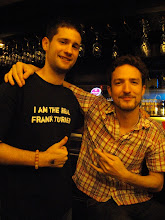I mean, this is a very important issue. There are around 45 million people in America without health insurance. And those who do have health insurance seem to have to fight an uphill battle to get their insurance companies to pay up when the time comes.
So with Obama vs. McCain being what 2008 will be all about, what are their stances on this issue?
Well, you check it out for yourself. Obama McCain
But here is something to think about. This comes from the book Naked Economics: Undressing the Dismal Science
Any insurance question ultimately begs one explosive question: How much information is too much? I guarantee that this will become one of the most nettlesome policy problems in coming years. Here is a simple exercise. Pluck one hair from your head. (If you are totally bald, take a swab of saliva from your cheek.) That sample contains your entire genetic code. In the right hands (or the wrong hands), it can be used to determine if you are predisposed to heart disease, certain kinds of cancer, depression, and – if the science continues at its current blistering pace – all kinds of other diseases. With one strand of your hair, a researcher (or insurance company) may soon be able to determine if you are at risk for Alzheimer’s disease – twenty-five years before the onset of the disease. This creates a dilemma. If genetic information is shared widely with insurance companies, then it will become difficult, if not impossible, for those most prone to illness to get any kind of coverage. In other words, the people who need health insurance most will be the least likely to get it – not just the night before surgery, but ever. Individuals with a family history of Huntington’s disease, a hereditary degenerative brain disorder that causes premature death, are already finding it hard or impossible to get life insurance. On the other hand, if insurance companies are forbidden from gathering such information, they will be crushed by adverse selection. Individuals who know that they are at high risk of getting sick in the future will be the ones who load up on generous insurance policies
A recent editorial in The Economist noted this looming quandary: ‘Governments thus face a choice between banning the use of test results and destroying the industry, or allowing their use and creating an underclass of people who are either uninsurable or cannot afford to insure themselves.’ The Economists, which is hardly a bastion of left-wing thought, suggested that the private health insurance market may eventually find this problem intractable, leaving government with a much larger role to play. The editorial concluded: ‘Indeed, genetic testing may become the most potent argument for state-financed universal health care. pp. 89, 90

No comments:
Post a Comment